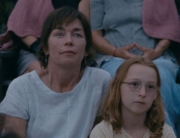
Mass begins, and is almost entirely set, in a small-town church. A piano lesson is in session in the church proper, while a young woman, Judy (Breeda Wool), enters the kitchen, her manner is nervous and apologetic, to find Anthony (Kagen Albright) cleaning dishes when she needs his help to set up a room. They are to meet Kendra (Michelle N. Carter), the facilitator of a meeting between two families, the nature of which they talk around and not about. The atmosphere careens between howling silence and perpetual social awkwardness.
Gail (Martha Plimpton) and Jay (Jason Isaacs) arrive at the church to meet with Richard (Reed Birney) and Linda (Ann Dowd). Gail and Jay are married, while Richard and Linda seem as though they might be divorced—they have arrived separately. The two couples are at first polite but clearly uncomfortable in one another’s presence. There is a fair amount of strained small talk, then the truth comes out: years ago, Richard and Linda’s son, Hayden, shot Gail and Jay’s son, Evan, in a school shooting.
The meeting is a belated attempt to make some sense of what happened. Gail and Jay have been fairly active since their son’s death in speaking out against gun violence; Richard and Linda have been completely silent. Jason attempts to reassure the other couple that he and Gail aren’t there to attack them, yet he also warns that they will not “apologize” for their feelings. Richard and Linda repeatedly emphasize that, while they were troubled by their son’s behavior (he was lonely, he got sucked into the world of violent video games, he built a pipe bomb) they had no reason to assume that he would do what he did. Gail and Jay at first hold back until they (especially Jay) angrily insist that this cannot have been the case.
Films that take place mostly in one room are notoriously difficult to bring to cinematic life. Often they yield comments like, “It would have worked better as a play.” You could say that about Mass. However, the dialogue would fail to convince equally on stage as it does on screen.
Plimpton, Birney, Isaacs, and Dowd are all excellent actors, and deliver what is asked of them with genuine depth of emotion. It is not so much that the dialogue is ridden with clichés, nor is it that we cannot adequately see where each character is coming from. It is more that the entire design of the film—in the inevitable lessons the characters learn, in their admissions of remorse, in monologues like Dowd’s that come at the end and neatly reveal crucial information about Linda—feels much tidier than life itself.
As such, Mass comes across more like a pamphlet for forgiveness rather than a compelling film.
















Leave A Comment